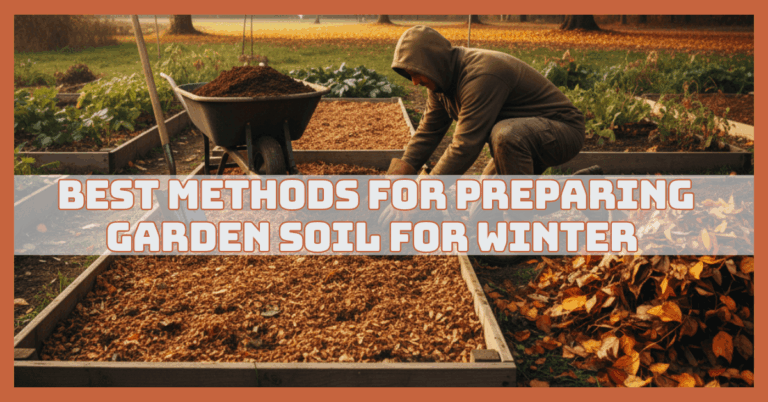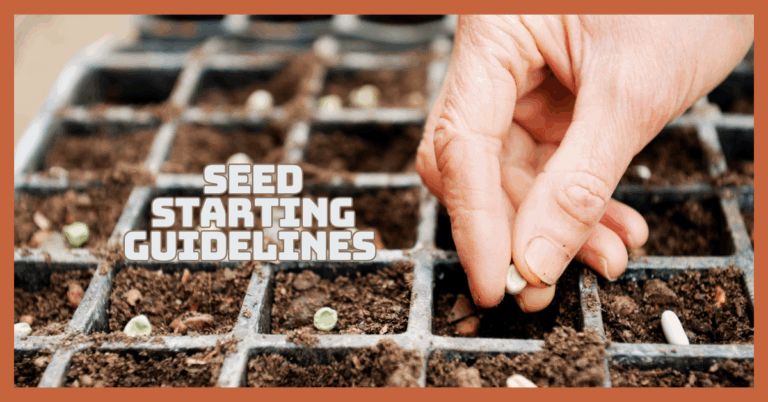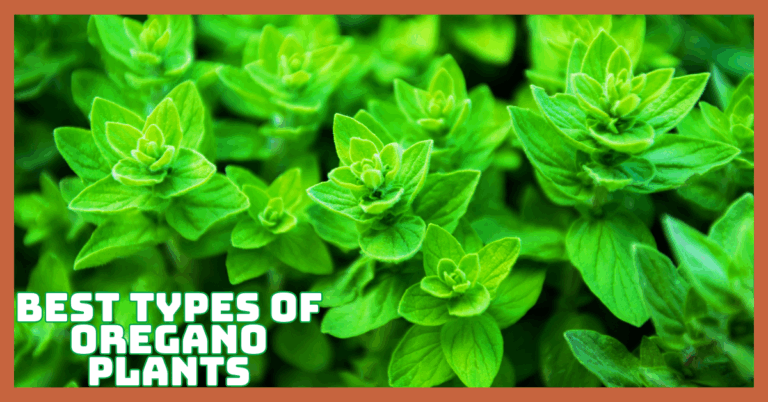Natural Fertilizers For Indoor Herbs
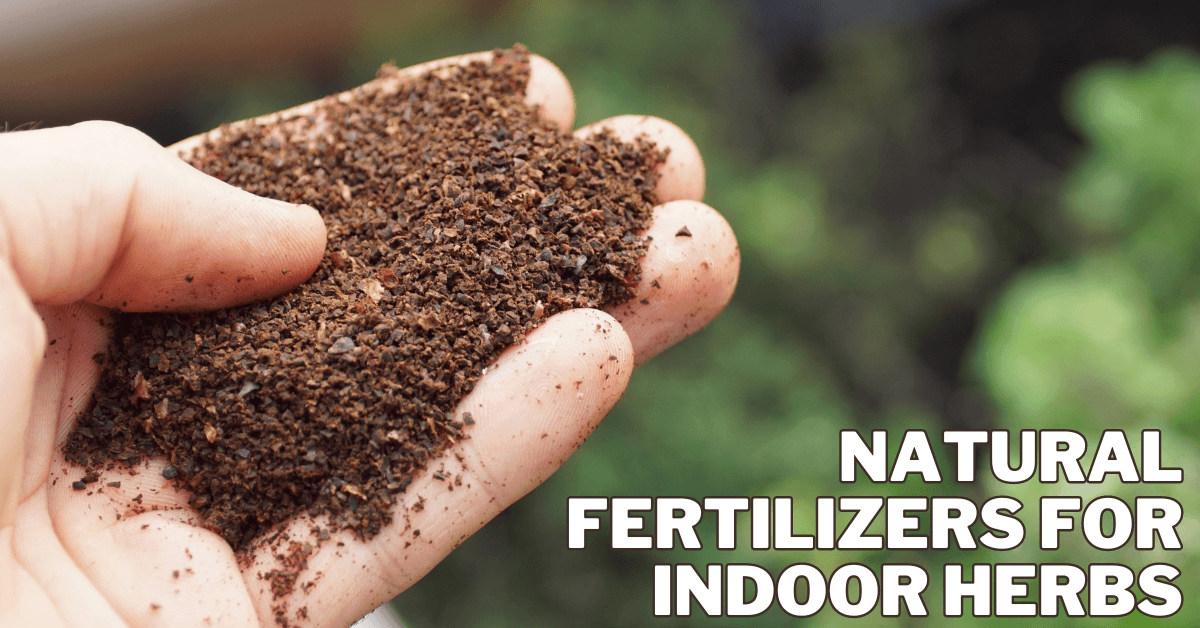
Natural Fertilizers For Indoor Herbs
In today's indoor gardening and sustainable living world, natural fertilizers for indoor herbs offer a safer and more eco-friendly alternative, enriching the soil with essential nutrients while promoting overall plant health and environmental sustainability.
However, ensuring the health and vitality of indoor herbs requires more than just sunlight and water – it requires attention to the soil's fertility.
While chemical fertilizers may seem like a quick fix, they can disrupt the delicate balance of indoor ecosystems and pose risks to both plant health and environmental sustainability.
In contrast, natural fertilizers offer a safer and more eco-friendly alternative, enriching the soil with essential nutrients while promoting the overall well-being of your indoor herbs.
This article'll explore various natural fertilizers suitable for indoor herb cultivation, from homemade compost tea to organic amendments like worm castings and seaweed extract.
By embracing natural fertilization methods, you can nurture thriving herb gardens and contribute to a healthier and more sustainable indoor environment.
Join us as we delve into the world of natural fertilizers, empowering you to cultivate vibrant and flavourful herbs right in the comfort of your own home.
Types Of Homemade Fertilizers For Indoor Herbs
Many gardeners are turning to homemade fertilizers as a natural and affordable answer in their quest for healthier, more vibrant indoor herb gardens.
Homemade fertilizers provide a sustainable approach to feeding indoor plants while lessening your environmental impact, unlike store-bought fertilizers, which could contain chemicals or additives.
With these homemade fertilizer recipes, you can nourish your indoor herbs naturally, fostering their health and vitality while minimizing your environmental footprint:
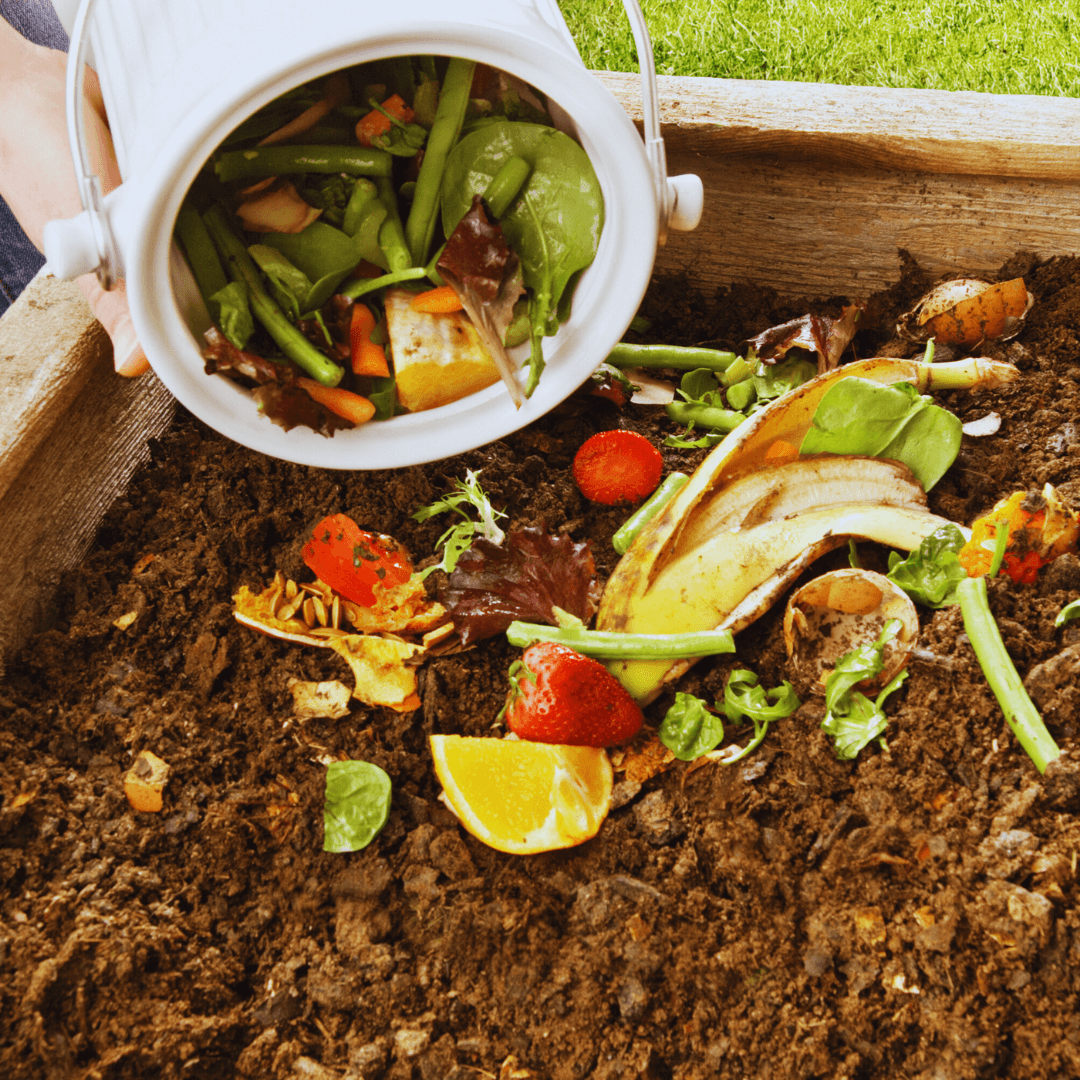
1. Compost Tea
Compost tea is a simple and effective way to provide indoor herbs with a nutrient-rich liquid fertilizer.
To compost tea, fill a container with water and add well-aged or composted manure. Allow the mixture to steep for several days, stirring occasionally to aerate it.
Through this process, organic matter in the compost is broken down by helpful microbes, releasing nutrients into the water.
Once the compost tea has steeped, sift the solids and add water to dilute it to the desired strength. Water your indoor plants with this DIY fertilizer to give them the nutrients they need for healthy growth and development.
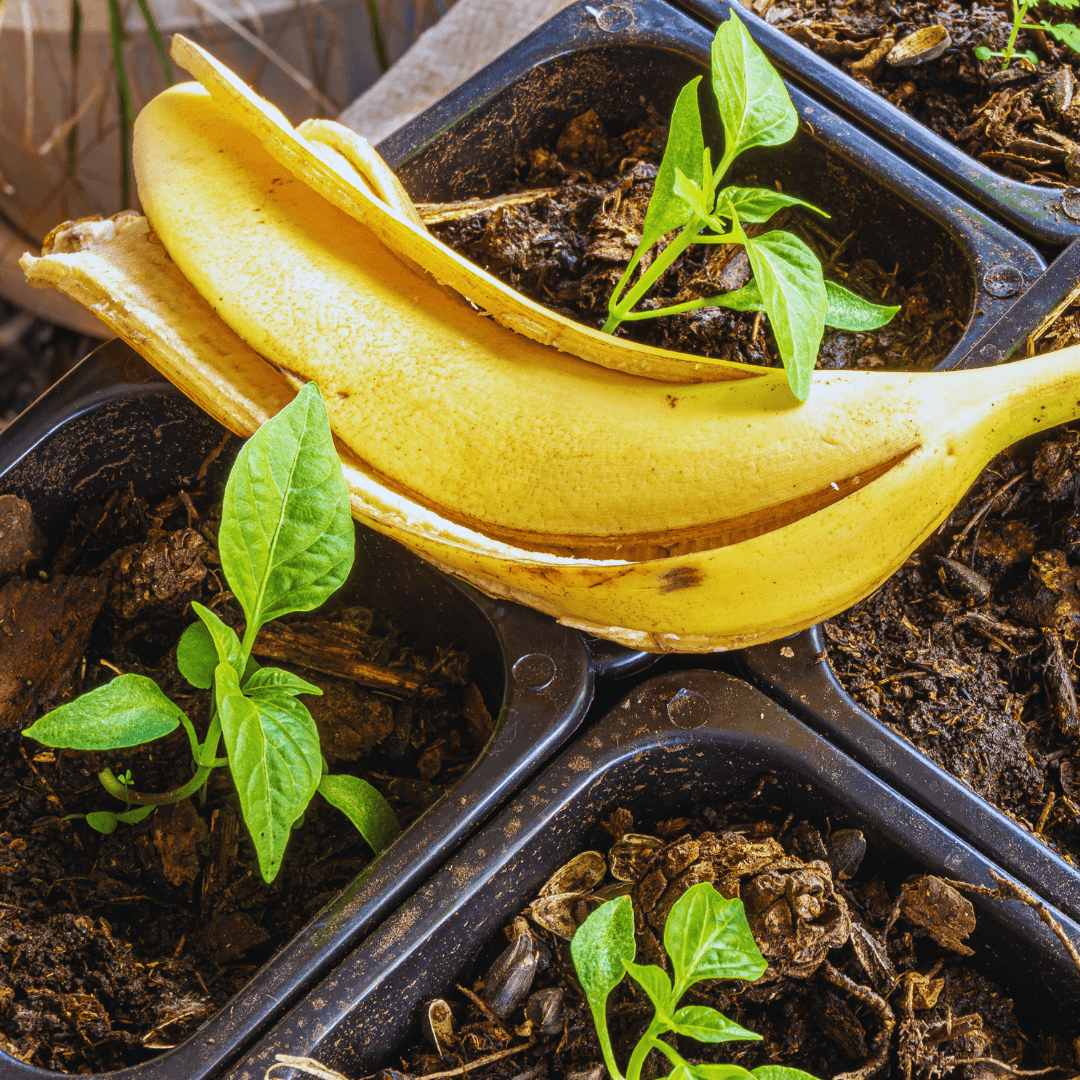
2. Banana Peels
Banana peel fertilizer is a natural fertilizer for indoor herbs. It harnesses the potassium-rich nutrients from banana peels to promote strong root growth and overall plant health.
To make banana peel fertilizer, chop banana peels into small pieces and place them in a container filled with water.
Allow the peels to steep for several days when the water will absorb the nutrients from the peels.
After steeping, strain out the banana peels and use the infused water to water your indoor herbs.
This potassium-rich fertilizer will help promote strong root growth and overall plant health.
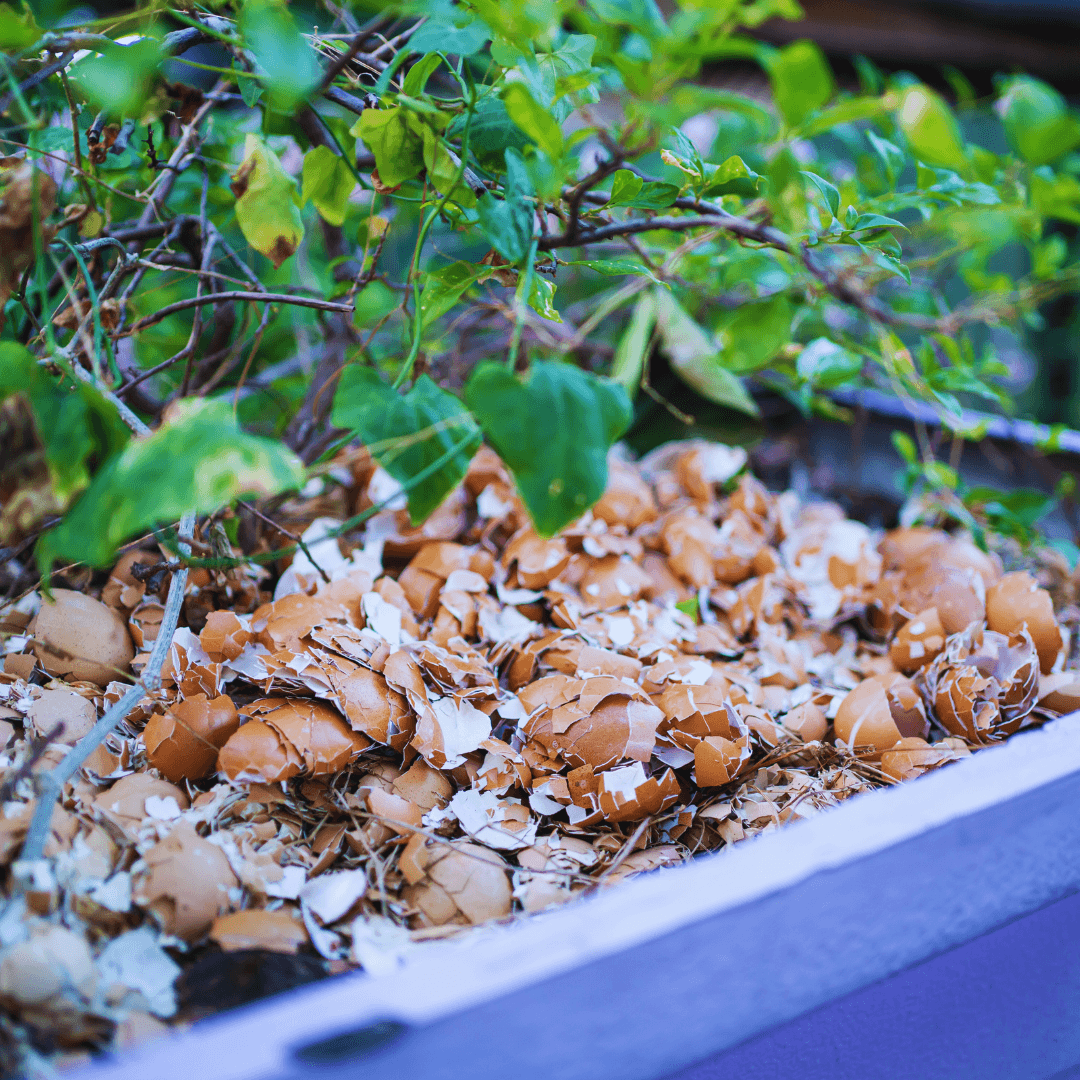
3. Eggshells
Crushed eggshells are a great way to obtain calcium and other essential elements for plant development.
The first step in creating eggshell fertilizer is collecting and cleaning eggshells from your kitchen.
When the eggshells are clean and dry, use a mortar, pestle, or blender to grind them into a fine powder.
Crushed eggshells may be scattered around the base of your houseplants or added to the soil. As the eggshells break down, calcium and other minerals are released into the soil, strengthening the soil's structure and promoting the development of strong roots.
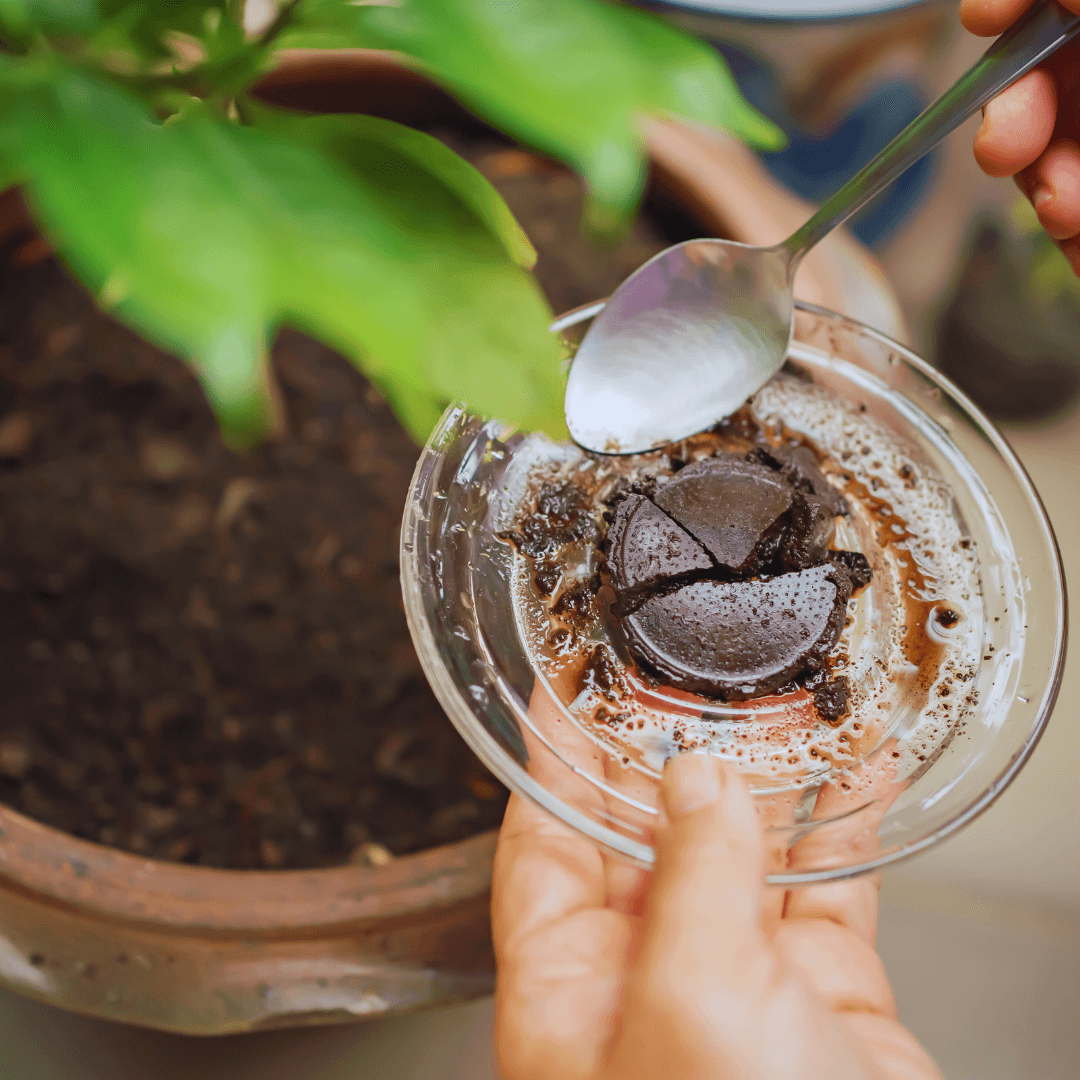
4. Coffee Grounds
Coffee grounds serve as a natural fertilizer for indoor herbs, enriching the soil with nitrogen, potassium, and other essential nutrients, fostering a healthier growing environment for your herbs.
After making your morning brew, save the spent coffee grounds and let them cool. Sprinkle the cooled coffee grounds around the base of your indoor herbs, or mix them into the soil.
Coffee grounds provide essential nutrients and help improve soil drainage and aeration, creating a healthier growing environment for your herbs.
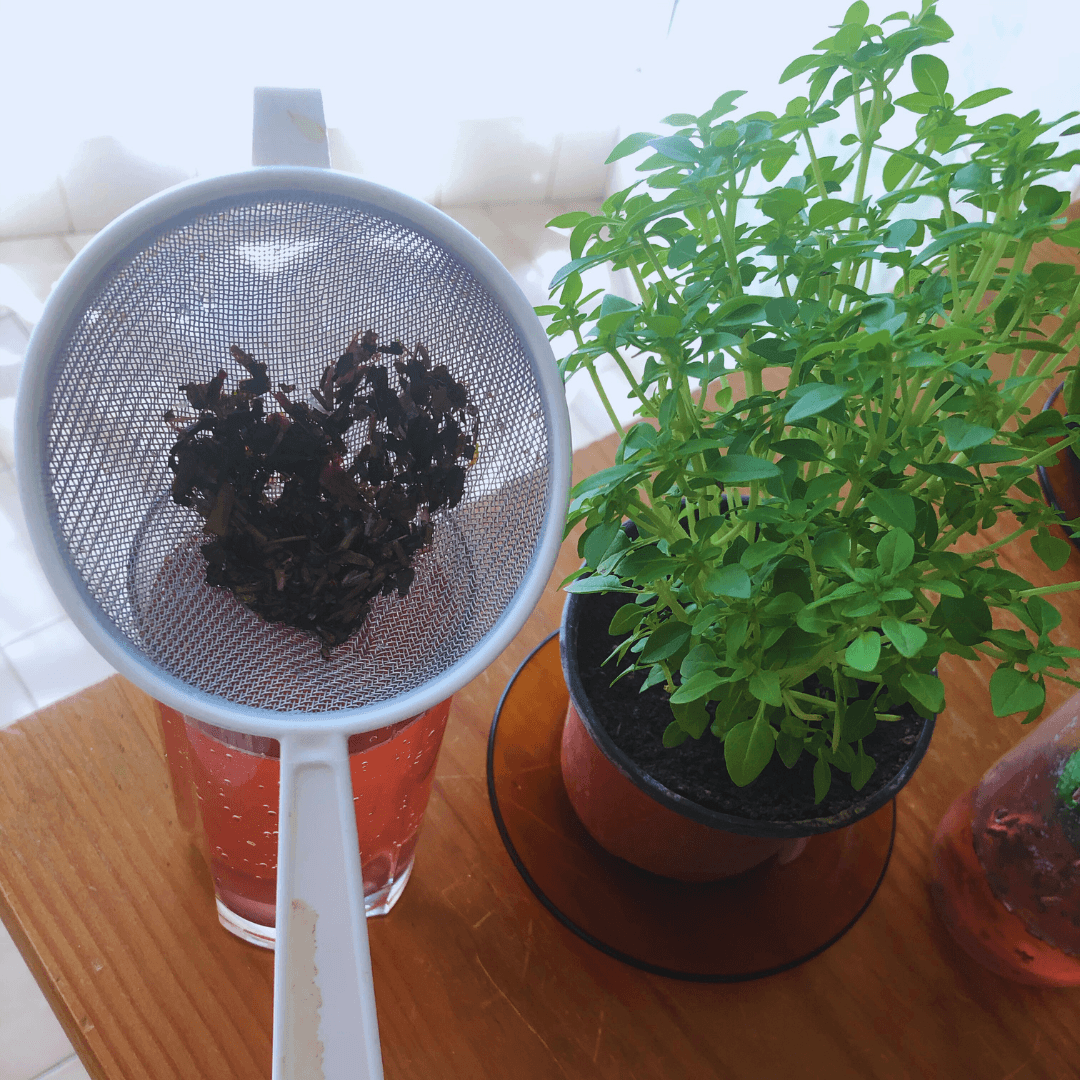
5. Herbal Infusion
Creating an herbal infusion is a natural way to provide your indoor herbs with a nutrient-rich fertilizer.
Choose nutrient-rich herbs such as nettle, comfrey, or alfalfa and place them in a container filled with water.
Allow the herbs to steep for several days, allowing the water to absorb the nutrients from the herbs.
After steeping, strain out the herbs and use the infused water to water your indoor herbs. This herbal infusion will give your herbs various essential nutrients, promoting healthy growth and vitality.
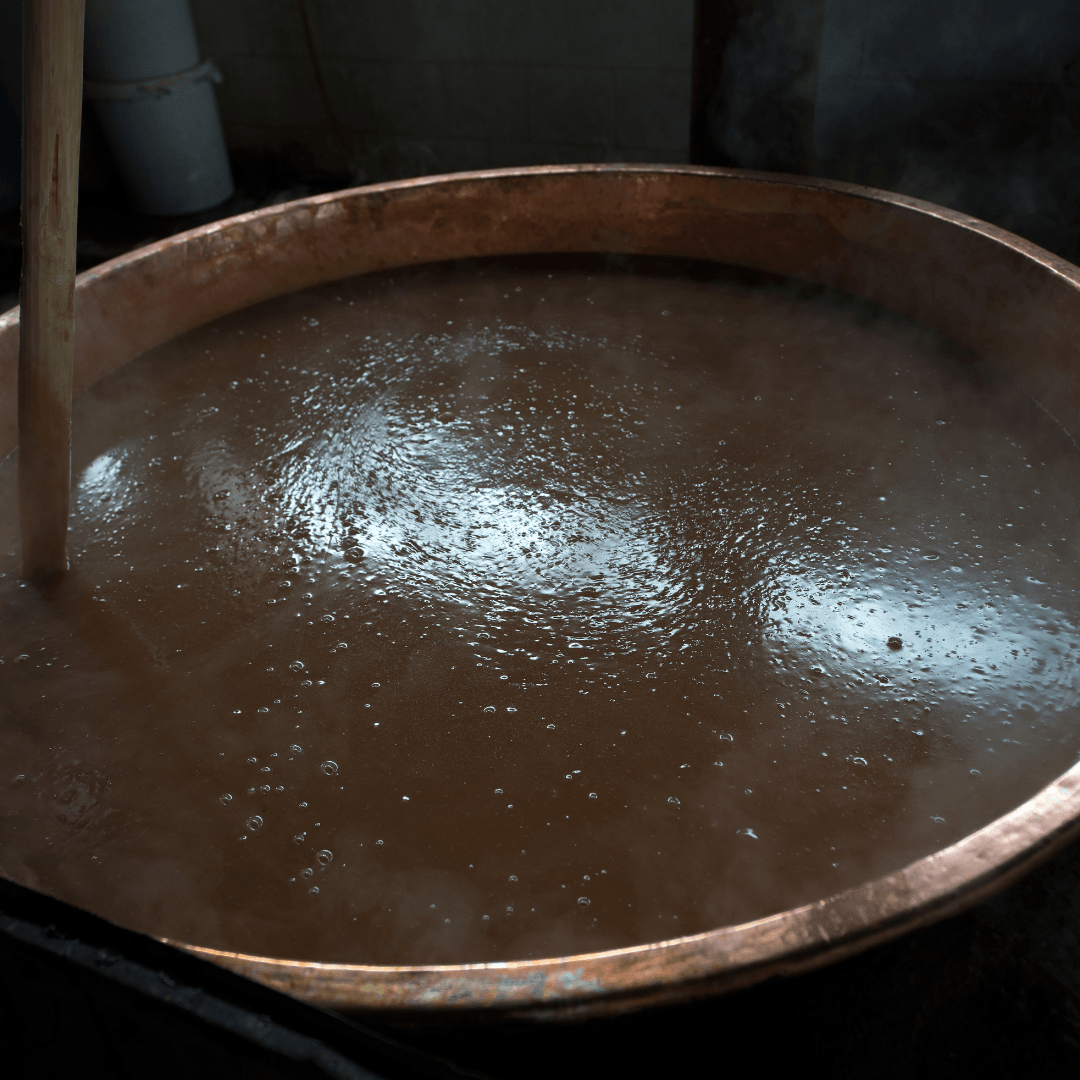
6. Molasses Solution
Molasses is a sugar-rich substance that can promote beneficial microbial activity in the soil, improving nutrient uptake by your indoor herbs.
Mix one tablespoon of unsulphured molasses with one gallon of water to make a solution. Stir the mixture until the molasses is completely dissolved.
Use this solution to water your indoor herbs occasionally. It provides them with a natural source of sugar and promotes a healthy soil ecosystem.
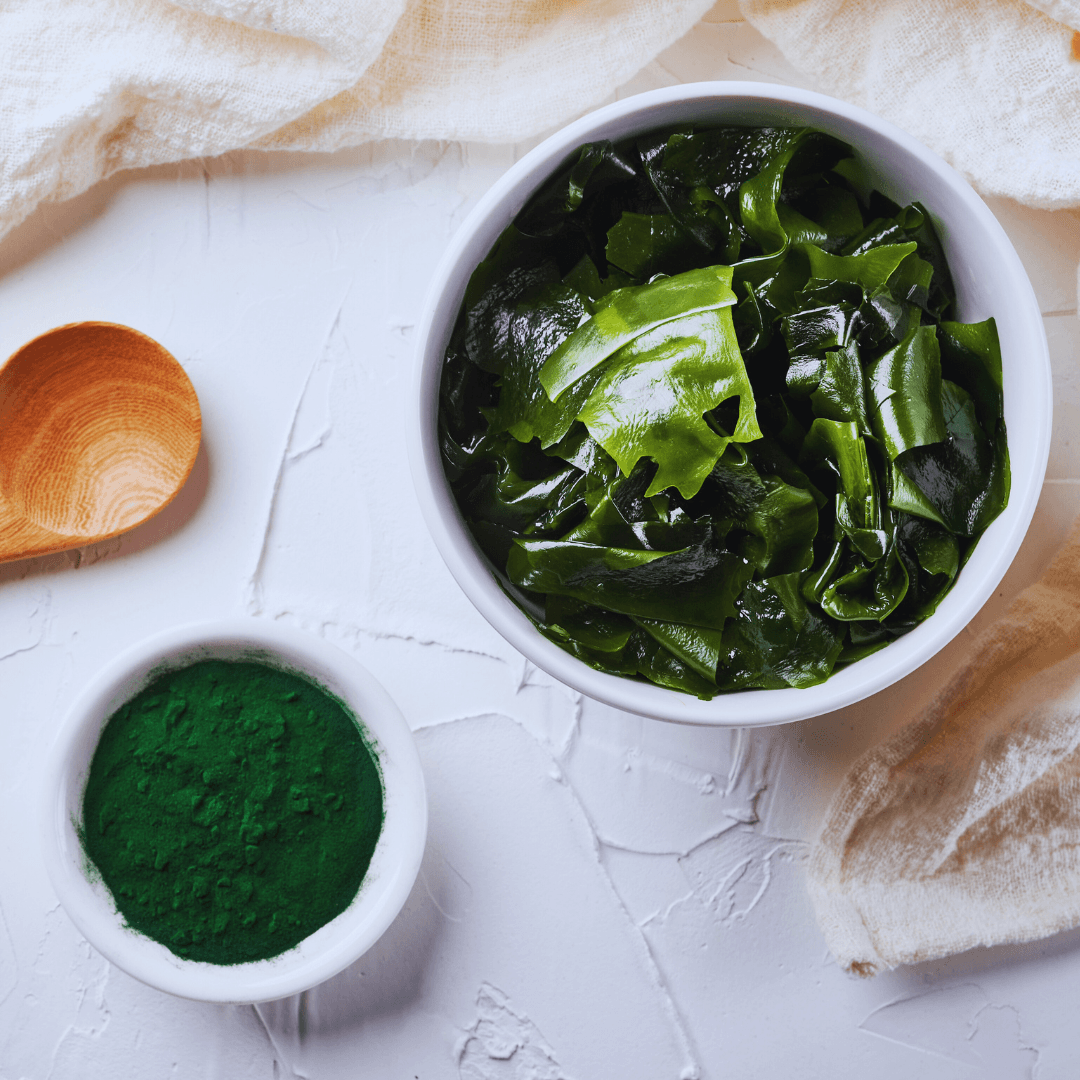
7. Seaweed Extract
Seaweed extract stands out as a natural fertilizer for indoor herbs. It offers a wide range of essential nutrients and promotes healthy growth and development by enhancing soil structure and root growth.
To use seaweed extract as a fertilizer for your indoor herbs, simply dilute it in water according to the package instructions.
Water your indoor herbs with this diluted solution to provide them with a wide range of vital nutrients and to encourage healthy growth and development.
Seaweed extract is a good option for indoor herb cultivation since it can improve soil structure, stimulate root growth, and increase resilience to environmental stressors.
Benefits Of Natural Fertilizers For Indoor Herbs
Natural fertilizers offer numerous benefits for herbs, promoting their health, vitality, and overall productivity. Here are some key benefits of using natural fertilizers for herbs:
1. Nutrient-Rich
Natural fertilizers like compost tea, banana peel fertilizer, and eggshell fertilizer provide herbs with diverse essential nutrients crucial for their growth and development.
Nitrogen supports leafy green growth; phosphorus aids in root development and flowering; potassium enhances overall plant health and resistance to stress; and calcium strengthens cell walls.
It prevents diseases, while micronutrients such as iron, zinc, and magnesium play vital roles in enzyme activation and photosynthesis.
2. Slow-Release
Since natural fertilizers have a slow release, herbs get a consistent and progressive supply of nutrients.
By releasing nutrients gradually, nutrient deficits or toxicities are reduced, as is the risk of nutrient leaching—the process by which nutrients are washed away by excessive water.
By giving plants nutrients when needed and encouraging steady, balanced development, slow-release fertilizers maintain the growth and vitality of herbs.
3. Soil Health
Natural fertilizers enhance the physical, chemical, and biological qualities of the soil, so enhancing its health.
They enhance soil structure by increasing its aggregation and porosity, allowing better air and water infiltration and root penetration.
Additionally, natural fertilizers foster the growth of beneficial soil microbes and earthworms, which help decompose organic matter, release nutrients, and suppress harmful pathogens, creating a fertile and resilient growing environment for herbs.
4. Environmental Sustainability
Using natural fertilizers promotes environmental sustainability by minimizing adverse effects on ecosystems and natural resources and decreasing dependency on synthetic chemicals.
Organic materials used in natural fertilizers are biodegradable and renewable, reducing pollution and conserving energy compared to the production and use of synthetic fertilizers.
Furthermore, natural fertilizers promote soil conservation and biodiversity, protecting water quality, wildlife habitats, and overall ecosystem health.
5. Cost-Effectiveness
Homemade natural fertilizers offer a cost-effective alternative to commercial fertilizers, as they can be made using inexpensive or readily available materials such as kitchen scraps, yard waste, and compost.
Gardeners may reduce landfill waste and promote a circular economy by recycling organic waste into nutrient-rich fertilizers, saving money on pricey fertilizer purchases.
6. Enhanced Flavour And Aroma
Herbs grown with natural fertilizers often exhibit superior flavour, aroma, and nutritional quality compared to synthetic fertilizers.
Natural fertilizers' balanced and diverse nutrients contribute to the herbs' robust growth and development, producing more flavourful and aromatic leaves, stems, and flowers.
These enhanced sensory qualities make herbs grown with natural fertilizers highly desirable for culinary purposes, enriching dishes with fresh and vibrant flavours.
7. Sustainable Gardening Practice
Natural fertilizer for indoor herbs embodies a sustainable gardening ethos, fostering ecological resilience, conserving natural resources, and promoting a regenerative approach to herb cultivation and food production.
By nourishing herbs with organic and renewable fertilizers, gardeners contribute to soil, water, and biodiversity conservation efforts, fostering a more sustainable and regenerative approach to herb cultivation and food production.
8. Improved Plant Resilience
Natural fertilizers are crucial in fortifying herbs against environmental stressors, enhancing their resilience and ability to thrive in challenging conditions.
Natural fertilizers bolster the herbs' physiological functions by supplying a balanced array of nutrients, including water uptake, nutrient absorption, and stress response mechanisms.
This, in turn, equips the herbs with the necessary tools to withstand adverse environmental factors such as drought, temperature fluctuations, pests, and diseases.
Additionally, natural fertilizers promote robust root development, anchoring the herbs securely in the soil and facilitating efficient nutrient uptake.
9. Enhanced Aesthetic Appeal
Using natural fertilizer for indoor herbs enhances the aesthetic appeal, fostering lush foliage, vibrant colours, and vigorous growth, adding beauty and charm to indoor and outdoor herb gardens.
The balanced nutrition provided by natural fertilizers fuels robust vegetative growth and flowering, resulting in herbs that are not only healthier but also more visually appealing.
With lush foliage, abundant blooms, and vibrant colours, these herbs add beauty, charm, and visual interest to indoor and outdoor herb gardens alike, enhancing the overall aesthetic appeal of the landscape.
Moreover, herbs grown with natural fertilizers exhibit greater resilience, vitality, and longevity, maintaining their aesthetic appeal throughout the growing season.
How To Make Homemade Fertilizers For Indoor Herbs
A quick and affordable approach to provide your plants with the nutrients they require for your homemade herb fertilizer.
The following techniques can be used to make homemade fertilizers for your herbs:
1. Homemade Compost Tea Fertilizer
- Fill a bucket with water.
- Add a shovel or two of well-aged or composted manure to the water.
- Stir the mixture well to ensure the compost is fully submerged.
- Stir the mixture occasionally to aerate it while you let it steep for a few days.
- After several days, strain out the solids and dilute the tea with water until it resembles weak tea.
- Use this compost tea to water your herbs, giving them a nutrient-rich boost.
2. Homemade Banana Peel Fertilizer
- Chop up banana peels into small pieces.
- Place the chopped banana peels in a container filled with water.
- Let the banana peels steep in the water for several days.
- Strain out the banana peels and use the infused water to water your herbs.
- The potassium-rich water from the banana peels will provide your herbs with a natural fertilizer.
3. Homemade Eggshell Fertilizer
- Collect and clean eggshells from your kitchen.
- When the eggshells are dry, use a mortar, pestle, or a blender to grind them into a fine powder.
- Instead of incorporating them into the soil, scatter the crushed eggshells around the base of your herbs.
- The calcium-rich eggshells will help nourish your herbs and improve soil structure.
4. Homemade Coffee Grounds Fertilizer
- The spent coffee grounds should be saved after making your daily beverage.
- Permit the coffee grinds to cool fully.
- Once the coffee grounds have cooled, scatter them around the base of your herbs or incorporate them into the soil.
- Rich in nitrogen, potassium, and other nutrients that promote the growth of herbs are coffee grounds.
5. Homemade Herbal Infusion Fertilizer
- Choose nutrient-rich herbs such as nettle, comfrey, or alfalfa.
- Place the herbs in a container filled with water.
- Let the herbs steep in the water for several days.
- Strain out the herbs and use the infused water as a natural fertilizer for your herbs.
- The nutrient-rich infusion will provide your herbs with essential vitamins and minerals.
6. Homemade Molasses Solution Fertilizer
- Mix one tablespoon of unsulphured molasses with one gallon of water.
- Stir the mixture until the molasses is completely dissolved.
- Use this molasses solution to water your herbs occasionally.
- The sugar-rich solution promotes beneficial microbial activity in the soil, enhancing nutrient uptake by your herbs.
7. Homemade Seaweed Extract Fertilizer
- Dilute commercially available seaweed extract in water according to package instructions.
- Use the diluted seaweed extract to fertilize your herbs.
- Seaweed extract contains trace minerals and growth-promoting hormones beneficial for herb growth and development.
8. Homemade Bone Meal Fertilizer
- Bone meal fertilizer offers a natural fertilizer for indoor herbs, providing essential phosphorus and calcium nutrients for root development and overall plant health.
- Crush or grind bone meal into a fine powder using a mortar, pestle, or blender.
- Either mix the bone meal into the soil or scatter it around the base of your herbs.
- Rich in calcium and phosphorus, bone meal is vital for growing roots and general plant health.
9. Homemade Fish Emulsion Fertilizer
- Mix fish emulsion with water according to the package instructions.
- Use the diluted fish emulsion to water your herbs.
- Fish emulsion is a potent organic fertilizer that provides a wide range of nutrients, including nitrogen, phosphorus, and potassium.
10. Homemade Wood Ash Fertilizer
- Collect wood ash from your fireplace or wood-burning stove.
- Around the base of your herbs, scatter a tiny bit of wood ash.
- Wood ash is rich in potassium and trace minerals, which can help improve soil pH and fertility.
11. Homemade Green Tea Fertilizer
- Steep used green tea leaves in water for several hours or overnight.
- Strain out the tea leaves and use the infused water to water your herbs.
- Green tea contains nutrients and antioxidants that benefit herb growth and plant health.
12. Homemade Vegetable Scraps Fertilizer
- Collect vegetable scraps such as carrot peels, potato skins, and lettuce leaves.
- Blend the vegetable scraps with water to create a nutrient-rich slurry.
- Use the vegetable scrap slurry to water your herbs, providing them with organic nutrients.
13. Homemade Worm Castings Fertilizer
- Harvest worm castings from a vermicomposting bin or worm farm.
- Mix the worm castings with water to create a nutrient-rich liquid fertilizer.
- Use the diluted worm castings to water your herbs, providing them with beneficial microbes and organic nutrients.
14. Homemade Milk Fertilizer
- Mix milk with water in a 1:4 ratio (one to four parts water).
- Use the diluted milk solution to water your herbs.
- Milk contains calcium and other nutrients that benefit herb growth and plant health.
These homemade fertilizers give your herbs essential nutrients, promoting healthy growth and enhancing their flavour and aroma. Experiment with different recipes to find the best fertilizer mix for your herbs.
FAQ
Can homemade indoor fertilizers be used for outdoor herb plants?
Answer: Yes, homemade indoor fertilizers can also be used for outdoor herb plants. However, outdoor plants may have different nutrient requirements due to soil composition, sunlight exposure, and water availability. It's important to consider these factors and adjust your homemade fertilizer's application rate and frequency accordingly.
Conclusion
Choosing natural fertilizer for indoor herbs is not merely a choice but a commitment to nurturing the plants and the environment in which they thrive.
By embracing sustainable gardening practices and avoiding chemical fertilizers, indoor herb growers contribute to a healthier ecosystem within their homes and beyond.
Furthermore, using natural fertilizers enhances the aesthetic appeal of indoor herb gardens, fostering lush foliage, vibrant colours, and robust growth.
This approach to herb cultivation aligns with a broader ethos of sustainable living, promoting ecological resilience and conservation of natural resources.
By nourishing indoor herbs with natural fertilizers, we ensure our plants' health and vitality and foster a more sustainable and harmonious relationship with the natural world.
I trust you enjoyed this article on Natural Fertilizers For Indoor Herbs. Please stay tuned for more blog posts soon. Take care!
JeannetteZ
>>>Please click here to read my all-inclusive article about Container Gardening<<<
>>>Are you interested in homegrown herbs and medicine? Please click here to find out more about it!<<<
Your Opinion Is Important To Me
Do you have thoughts, ideas, or questions? I would love to hear from you. Please leave me your questions, experiences, and remarks about this article, Natural Fertilizers For Indoor Herbs, in the comments section below. You can also reach me by email at Jeannette@Close-To-Nature.org.
Disclosure
This post may contain affiliate links. As an Amazon Associate and other affiliate programs, I earn from qualifying purchases at no extra cost to you. Please read my full affiliate disclosure.
You might also enjoy these blog posts:
Benefits Of Vitamin B12 For Women
Understanding The Symptoms Of Stress
Understanding Heat Stroke In A Cat
How To Toilet Train A 6-Month-Old Puppy


